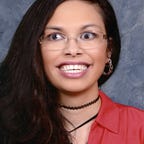3 Things I Wish I Could Tell the World About Being Visually Impaired
Losing most of my eyesight taught me to see the world in a new way.
Image by Myriams-Fotos from Pixabay
1. People who are blind can live happy and fulfilling lives.
Please don’t pity me because of my disability.
I was born with a complicated medical condition that caused my vision to slowly deteriorate over time. I am in my early thirties and I can’t drive a car or read books with normal sized print. I use a white cane when I travel.
My disability is often a huge challenge, but it has also taught me about my own inner strength. I am happily married and I am working in a field that I love. I also have two wonderful pets and have written three books.
As a writer and disability advocate, I often encounter people who are losing their vision. Becoming blind or visually impaired can be a painful adjustment, but a person who is blind can still live a happy and fulfilling life. After taking the necessary time to mourn, I encourage people to remember that blindness is not the end of life, it is just the beginning of a different way of experiencing the world.
2. Modern technology can do amazing things for the disability community.
Technology helps to create equality for people with disabilities.
Two pieces of technology I use every day are my iPhone and my iPad. Both are equipped with adaptive software and voiceover technology. These devices can read aloud anything that is displayed on the screen. Although my visual acuity has continued to decline, I can still read the books I love by using voiceover and the Kindle app.
There is no end to the wonders of adaptive technology. With the KNFB Reader, I can take a picture of any printed text (such as a medicine bottle or the menu at a restaurant), and it will read the text to me. Aira is another application that connects sighted assistants with visually impaired clients to help with daily tasks, travel, or tech support questions.
3. Blindness is a spectrum.
Many people who are visually impaired can still see light, movement, or read very large text.
Not everyone who uses a white cane is completely blind. Many people who are blind still have some amount of useable vision. The experience of blindness or having a visual impairment is different for everyone.
I am considered to have low vision or to be visually impaired. My vision fluctuates based on many different factors, including how tired my eyes are and how much pain I’m experiencing. Some days I can read street signs or recognize friends from across the room. Other mornings, I wake up to find that the entire world is one large blur.
In the end, the most important thing is to be kind to one another.
You don’t have to understand someone’s disability to be kind to them. Everyone deserves respect.
I once interviewed a woman with multiple sclerosis. Although she can walk very short distances, she uses a wheelchair when she goes shopping because standing for long periods of time is very painful for her.
She told me, “Lots of times in the past, I’ve stood up for a minute in order to reach something from a high shelf at the grocery store. When I do that, people accuse me of faking. I’ve had strangers say to me in the middle of the cereal aisle, ‘You don’t really need that wheelchair! I caught you faking!’”
When I asked her how she responds to these microaggressions, she answered, “I do my best to just ignore them. I don’t owe them an explanation. I don’t need to explain to them that some days I can get around better than others, or that not everyone who needs a wheelchair is paralyzed. But it still hurts when people say cruel things.”
People with disabilities face a world that judges us based on misinformed ideas. Society assumes that we are incapable and that having any form of impairment is something to be pitied. This pity can turn into anger or fear when we don’t act the way society expects.
It has taken me many years to accept myself. I am proud of my disability. I recognize it as an important part of my identity. It is my hope that through my writing, I can inspire others and help them to find the same sense of empowerment I have discovered.
